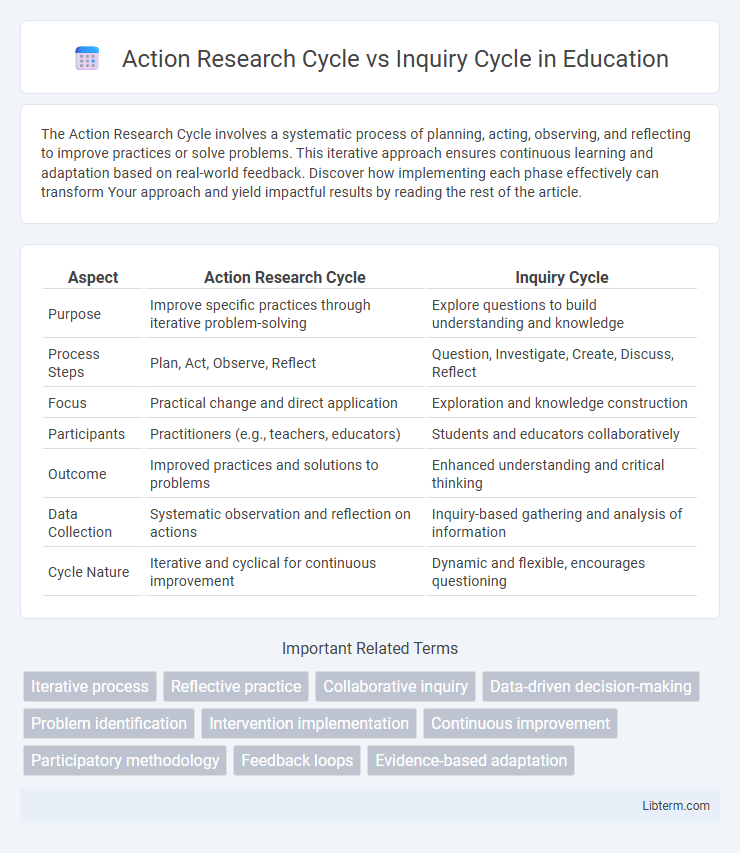The Action Research Cycle involves a systematic process of planning, acting, observing, and reflecting to improve practices or solve problems. This iterative approach ensures continuous learning and adaptation based on real-world feedback. Discover how implementing each phase effectively can transform Your approach and yield impactful results by reading the rest of the article.
Table of Comparison
| Aspect | Action Research Cycle | Inquiry Cycle |
|---|---|---|
| Purpose | Improve specific practices through iterative problem-solving | Explore questions to build understanding and knowledge |
| Process Steps | Plan, Act, Observe, Reflect | Question, Investigate, Create, Discuss, Reflect |
| Focus | Practical change and direct application | Exploration and knowledge construction |
| Participants | Practitioners (e.g., teachers, educators) | Students and educators collaboratively |
| Outcome | Improved practices and solutions to problems | Enhanced understanding and critical thinking |
| Data Collection | Systematic observation and reflection on actions | Inquiry-based gathering and analysis of information |
| Cycle Nature | Iterative and cyclical for continuous improvement | Dynamic and flexible, encourages questioning |
Introduction to Action Research Cycle and Inquiry Cycle
The Action Research Cycle involves iterative phases of planning, acting, observing, and reflecting to solve real-world problems through practical interventions. The Inquiry Cycle emphasizes a systematic process of questioning, investigating, analyzing, and concluding to generate new knowledge or insights. Both cycles prioritize continuous learning and improvement but differ in their primary focus, with Action Research centered on change implementation and the Inquiry Cycle on knowledge discovery.
Defining the Action Research Cycle
The Action Research Cycle is a structured process involving iterative stages of planning, acting, observing, and reflecting, aimed at solving practical problems through active participation. It emphasizes collaborative inquiry and continuous improvement within real-world settings, enabling practitioners to implement and evaluate changes systematically. This cycle differs from the Inquiry Cycle by focusing specifically on actionable interventions and feedback loops for immediate application and adaptation.
Defining the Inquiry Cycle
The Inquiry Cycle is a systematic process of exploring questions or problems through phases of questioning, investigating, analyzing, and reflecting, emphasizing continuous learning and adaptation. It differs from the Action Research Cycle by prioritizing open-ended inquiry and discovery rather than immediate practical intervention. Defining the Inquiry Cycle involves framing focused questions, gathering relevant data, interpreting findings, and revising understandings to deepen knowledge and generate new insights.
Key Stages of the Action Research Cycle
The Action Research Cycle consists of key stages including planning, acting, observing, and reflecting, each designed to systematically address practical problems through continuous feedback and iterative improvement. This cycle emphasizes collaborative problem-solving and real-time application of findings, differentiating it from the broader Inquiry Cycle that often involves more exploratory and theoretical phases. Effective implementation of the Action Research Cycle results in actionable insights and sustainable change within educational, organizational, and community settings.
Key Stages of the Inquiry Cycle
The Inquiry Cycle comprises key stages such as questioning, investigating, reflecting, and acting, fostering a continuous loop of exploration and learning. These stages emphasize critical thinking and evidence-based analysis, differing from the more iterative planning, acting, observing, and reflecting phases of the Action Research Cycle. By prioritizing curiosity-driven inquiry, the Inquiry Cycle supports deeper understanding and iterative refinement through systematic investigation.
Core Differences Between Action Research and Inquiry Cycles
The core difference between the Action Research Cycle and the Inquiry Cycle lies in their purpose and application; Action Research is focused on solving immediate problems through iterative planning, acting, observing, and reflecting within a specific context, often in educational or organizational settings. The Inquiry Cycle emphasizes a broader investigation process aimed at generating new knowledge through systematic questioning, exploration, and evidence gathering, typically used in academic or scientific research. While both involve cyclical stages, Action Research prioritizes practical change and stakeholder collaboration, whereas the Inquiry Cycle centers on conceptual understanding and theory development.
Similarities Between Action Research and Inquiry Cycles
Both Action Research and Inquiry Cycles emphasize iterative processes involving planning, acting, observing, and reflecting to foster continuous improvement. Each cycle relies on data collection and analysis to inform decision-making and adapt strategies in real-time. These methodologies prioritize collaboration and active participation, promoting evidence-based practices within educational and organizational settings.
Applications in Educational Settings
The Action Research Cycle in educational settings emphasizes iterative problem-solving through planning, acting, observing, and reflecting to improve teaching practices and student outcomes. The Inquiry Cycle focuses on generating questions, gathering data, analyzing evidence, and drawing conclusions to develop deeper understanding and inform instructional strategies. Both cycles support evidence-based decision-making but differ in approach, with Action Research favoring practical interventions and the Inquiry Cycle prioritizing systematic investigation.
Benefits and Challenges of Each Cycle
The Action Research Cycle offers practical benefits by promoting iterative problem-solving and real-time improvements, fostering collaboration among participants, but it faces challenges like requiring sustained commitment and potential bias from participant involvement. The Inquiry Cycle enhances deep understanding and critical thinking through systematic questioning and reflection, yet it may encounter difficulties such as prolonged timelines and complexity in managing diverse data sources. Both cycles provide complementary strengths for research with distinct demands on time, engagement, and analytical rigor.
Choosing the Right Cycle for Your Purpose
Choosing the right cycle depends on your goal: the Action Research Cycle emphasizes iterative problem-solving within a specific context, ideal for practical improvements and immediate application. The Inquiry Cycle focuses on deep questioning and reflection, suitable for exploring complex issues and generating new understanding. Aligning your purpose with these distinct approaches ensures effective research outcomes and meaningful insights.
Action Research Cycle Infographic

 libterm.com
libterm.com